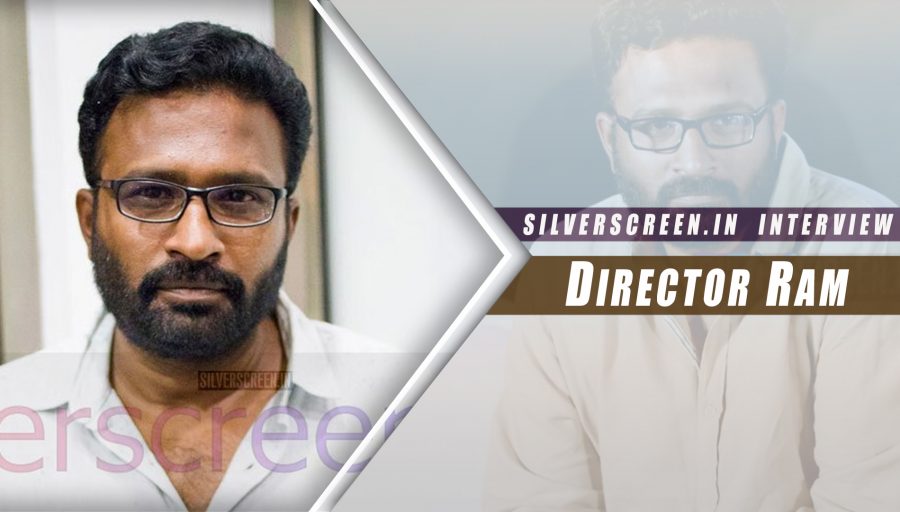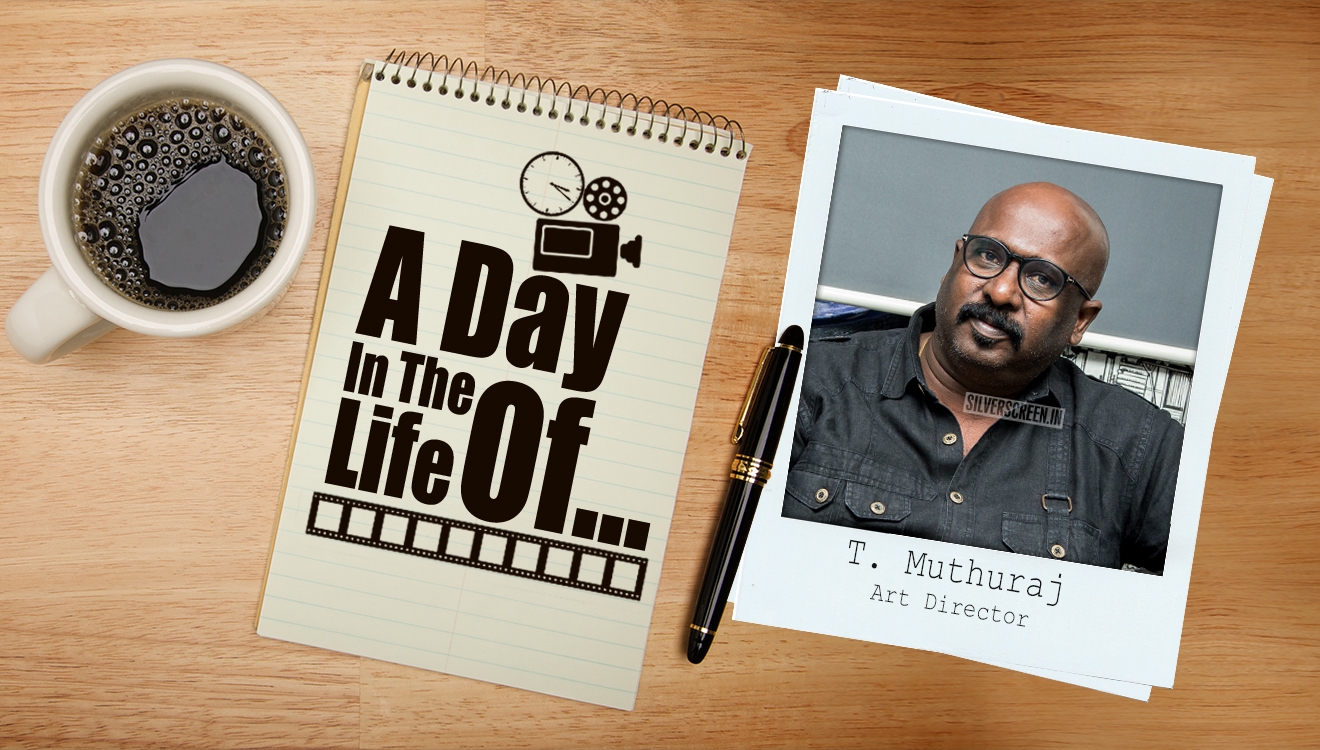Men are not able to open up to women, Ram declares during our interview. “Especially contemporary Tamil men. They carry many prejudices. They have a set scale to measure women – by her looks, status, ‘character’… the men are not able to cope with the changes in the society, they feel humiliated and suffocated; they react violently.”
Taramani, director Ram’s upcoming movie, is a take on gender equations.
*****
If there’s something that director Ram is asked often, it’s a question about the characters in his movies. He’s asked how much the characters resemble his real persona. That’s one of the things that Ram emphasizes during our conversation.
Vehemently.
I am not any of my characters, he says, when we speak on the phone one January evening, between editing sessions of his upcoming Peranbu.
“So, don’t judge me based on them.”
He also doesn’t sympathise with the lead character of Kattradhu Tamil MA and Thanga Meengal. Both were dark-themed films, about complex misfits who constantly rebelled with their surroundings. In Kattradhu Tamil MA, a young post-graduate in Tamil literature is alienated in a world that has no space for arts and humanities. Thanga Meengal, on the other hand, was about corrosion of values in the education system. It also featured Ram in the lead role as the father of an eight-year-old girl.
“People tend to think I am an angry, emotional guy – like Prabhakar in Kattradhu Tamil MA or Kalyani in Thanga Meengal,” he declares, “I hold a Masters in Tamil; that’s probably the only thing that connects us.” He understands their angst, their frustrations – but it stops right there. “I’m a totally different person.”
Actor Jiiva, who played Prabhakar in Kattradhu Tamil, had to undergo therapy to get out of the skin of the character.
The film was emotionally draining, Ram admits. “Jiiva was in his early twenties then. He is a sweet chap. But it was torture for everyone because it’s a depressing movie. The plot is dark. Its lighting pattern and locations are melancholic. It was stressful.”
*****
In a career spanning nine years, 42-year-old Ram has directed two films, and is working on two others – Taramani and Peranbu – that belong to a lighter genre. Taramani, starring Andrea and Vasanth Ravi, is the last film in his Globalisation Trilogy. His fourth film Peranbu, according to the director, is the most important one in his career.
It stars Mammootty, whom Ram calls a “wizard on screen”.
Also because Ram learned “the art of acting” from him. “Of all the actors I have worked with so far, Mammookka belongs to a different league. The days I spent with him on the sets of the film were workshop on acting and film-making.”
Mammooty plays the lead role, Amudhavan, in Peranbu. It was the actor who recommended Anjali, a transgender actor, to play an important role in the film, which happens to be Mammooty’s first Tamil film in the last 12 years (after Vishwa Thulasi in 2004).
Mammooty, Ram says, told him that the hallmark of a good actor is that he knows when not to act. “I had heard that from other people, too,” Ram recalls, “but Mammooty actually does it. He shows you how true it is.”
Of course, there were some disagreements on the sets, routine ones, really, “but every conversation with him helped me learn something new,” the director declares, “If I didn’t like a particular shot, I would explain it to him. He would readily agree for a re-take if my explanation made sense to him. Also, he never does night shoots. But for Peranbu, we had to do a lot of night shoots in Chennai, and some early morning sunrise shoots in Kodaikkanal. He gladly did all of that. I have been lucky enough to work with two masters in my career – Balu Mahendra and Mammookka. Now I think I should do my next film too with Mammookka.”
Ram’s favourite films of Mammooty include Thalapathy, Sukrutham, Amaram, Thaniyavarthanam and Mrugaya. “Kattradhu Tamil has faint shades of Sukrutham,” Ram says.
*****
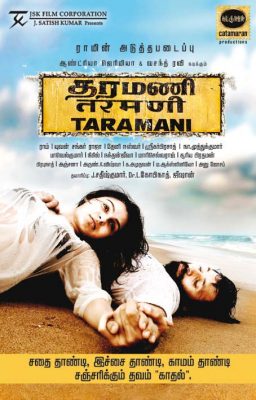 Taramani is Ram’s first film set in urban spaces. A take on gender equations, “it’s about how gender roles and man-woman relationships underwent drastic changes in the post-globalisation era,” Ram says, adding that the movie doesn’t take sides.
Taramani is Ram’s first film set in urban spaces. A take on gender equations, “it’s about how gender roles and man-woman relationships underwent drastic changes in the post-globalisation era,” Ram says, adding that the movie doesn’t take sides.
A significant change was that women became more self-reliant, he observes. “Globalisation created a liberal space for women to express themselves. It gave them an identity, beyond the usual tags of mother, sister, wife, and daughter. At least to a great extent. More and more women travel these days, that too with their own money. However, are the men who live with them and work with them able to understand the change? That’s one of the questions Taramani is handling.”
Stanley Kubrick’s Eyes Wide Shut, many films of Roman Polanski, Alfonso Cuaron’s Mexican drama Y Tu Mama Tambien, Tamil films like Marupadiyum and Aval Appadithaan, and many literary pieces served as inspiration for Taramani.
That, and those real-life relationships that he got to witness: of independent women, and violent men.
It’s unfair to call the whole Tamil film industry misogynist, Ram declares when I steer our conversation to recent events. “As far as I know, this kind of humiliation never happens in the space I work,” he says, referring to the interview in which a director made derogatory remarks about actresses. “A lot of women work in every department in Kollywood. When I joined the industry, this wasn’t the case. There were few women, and it was very difficult for them to foray into direction. Now, things are different. I treat my co-workers, actors and actresses as artistes playing the characters I created, not on the basis of their gender. The costumes I decide for my lead actress are always according to the character she plays. I have never, and I will never try to make money by exhibiting an artiste’s body.”
*****
Ram graduated from Madras Christian College in the 90s. After a stint as a script-writing assistant, as part of Balu Mahendra’s team, he moved to Mumbai to work with Raj Kumar Santhoshi in films like Lajja and Pukar. The progressive, cosmopolitan college campus, and the highly professional work spaces changed his perspective about gender roles. “I studied Literature in college,” he says, “Literature helps you understand the other gender in a better way. I grew up in a family where women were given more importance than men. My sister was sent to an English medium school, while I was put in a local Tamil medium school. In Madras Christian College, there were people from all over the world. Interactions with them widened my view.”
Kattradhu Tamil MA, too, taught him many lessons. “Till then, my knowledge about cinema came from the time I spent with Balu Mahendra and Santhoshi, and from movies and books. I didn’t know much about about film-making, thus I was more free-minded. We shot the film in guerrilla style. I did it for the sheer pleasure of making a film,” Ram says.
None of the director’s films have antagonists. It’s difficult to do a mainstream film without an antagonist, he says, because it makes it tougher for the audience to understand the protagonist. “So, I give more exposition to the protagonist, but it makes me look like I am sympathising with the lead men of Kattradhu Tamil and Thanga Meengal. I am just using them as a tool, though. I always begin a story with a thesis. I create the character to present my thesis. I’m more emotionally connected to my thesis, than to the characters.”
Recommended
While Kattradhu Tamil was an argumentative film, it’s not about Tamil language as many people see it, Ram adds, “The film might look arrogant and emotional, but it is about how liberal arts and humanities are neglected today. It’s about how the society is creating a sociopath. That the lead character is a Tamil graduate is just a coincidence. Initially, I was planning to make the film in Hindi.”
And, it was easier to make his first film than the rest. “I think as you gain more experience, you tend to lose originality. After the first movie, I became a serious film student. When I was making Taramani, I had more clarity. I could balance what I learned from my previous two films with theoretical knowledge.”
Ram’s a “better filmmaker now”, and is “evolving”. He’s no longer the person who made Kattradhu Tamil; is more calm and mature, and doesn’t get angry easily.
I’m more grounded, he says.
*****
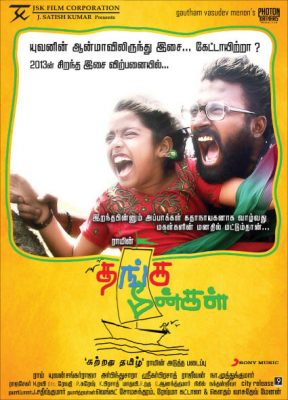 It was Gautham Vasudev Menon – a filmmaker known for his romantic dramas – who produced Thanga Meengal, a dark and raw film. Despite the stark contrast between the genre of their films, the duo was quite comfortable with each other.
It was Gautham Vasudev Menon – a filmmaker known for his romantic dramas – who produced Thanga Meengal, a dark and raw film. Despite the stark contrast between the genre of their films, the duo was quite comfortable with each other.
“GVM loved Kattradhu Tamil. He likes the kind of films I make. I like his films too. We bonded well because we had no ego differences. For me, working with anyone is easy. I try to accept people as they are. It’s important to rein in your ego because film-making is a team work. A director should respect everyone – from a set assistant to the film’s lead actors. Managing a set is the most difficult thing. It requires a lot of skills.”
On the sets of Thanga Meengal, the whole crew lived like a family, Ram says.
A video of GVM singing Aananda Yazhai, a popular number from the film, had gone viral in 2013. The soundtrack made the movie even more popular among the masses.
“I don’t know anything about music. In my films, there are great songs because I don’t know anything about music,” Ram laughs, “I don’t give my music directors any instruction in particular. If the music conveys the emotion of the film, I give the nod. If the music doesn’t suit the situation, I would reject it. Even if it’s a great composition.”
Aananda Yazhai had also fetched Na Muthukumar, the late lyricist, a National Award. Muthukumar and Ram had grown up together.
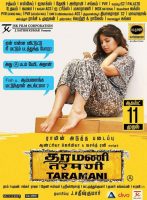 “We studied together. He helped me become what I am. He understood my scripts like no one else. He would listen to my rants endlessly, and would understand me perfectly. I don’t know where I am going to find a friend and colleague like him,” he says, “I miss him.”
“We studied together. He helped me become what I am. He understood my scripts like no one else. He would listen to my rants endlessly, and would understand me perfectly. I don’t know where I am going to find a friend and colleague like him,” he says, “I miss him.”
Editor’s Note: Taramani is releasing in theatres on August 11, 2017, four months after this interview was published. The film was awarded an A certificate by the censor board of India for reasons such as it shows a woman drinking liquor neat. Ram took on the board in the posters of the film which features a cheeky (fake) conversation: Anjali’s characters asks a man, probably her husband, “Why are you watching the film without me?” The man replies, “Because it’s an A film.” Her reply goes,“Fish you, aren’t women adults too?”
*****
The Director Ram interview is a Silverscreen exclusive.
